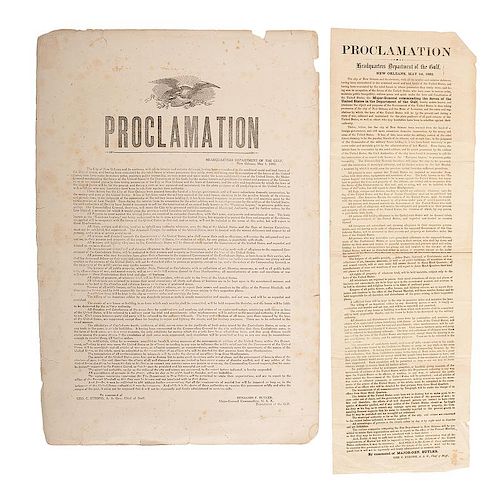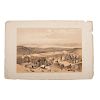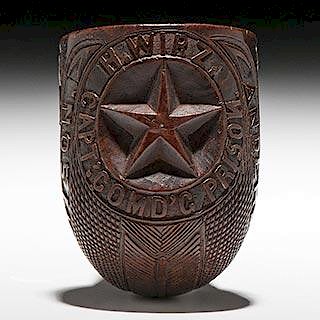New Orleans Occupation, Rare Proclamations Issued by Benjamin Butler, May 1, 1862, Including Necessity Printing
About Seller
6270 Este Ave.
Cincinnati , OH 45232
United States
With offices in Cincinnati, Cleveland and Denver, Cowan’s holds over 40 auctions each year, with annual sales exceeding $16M. We reach buyers around the globe, and take pride in our reputation for integrity, customer service and great results. A full-service house, Cowan’s Auctions specializes in Am...Read more
Two ways to bid:
- Leave a max absentee bid and the platform will bid on your behalf up to your maximum bid during the live auction.
- Bid live during the auction and your bids will be submitted real-time to the auctioneer.
Bid Increments
| Price | Bid Increment |
|---|---|
| $0 | $25 |
| $500 | $50 |
| $1,000 | $100 |
| $2,000 | $250 |
| $5,000 | $500 |
| $10,000 | $1,000 |
| $20,000 | $2,500 |
| $50,000 | $5,000 |
| $100,000 | $10,000 |
About Auction
Feb 21, 2017 - Feb 22, 2017
Cowan's Auctions dawnie@cowans.com
- Lot Description
Lot of 2 printed broadsides, including 7.5 x 24 in. Proclamation announcing the Union occupation of New Orleans, LA, accompanied by a necessity printing of the same proclamation, 15 x 22.5 in., produced on reverse side of Crimean War-date lithograph entitled The New Works at the Siege of Sebastopol on the Right Attack. From the Mortar Battery on the Right of Gordon's Battery, published by Paul & Dominic, 1855. Each example features a printing of the Proclamation from the Headquarters of the Department of the Gulf, New Orleans, May 1, 1862. Both are signed in type by Major General Benjamin Butler, with one also signed in type by George C. Strong, A.A.G., Chief of Staff.
On the surface, Butler's Proclamation sounds reasonable: Citizens of New Orleans will now follow Martial Law and the Laws of the United States. They will give up arms and cease flying any flags or banners of the Confederacy or representative of any authority other than the United States may not be displayed. The only exceptions are the flags of the various foreign consulates, provided they have not sworn allegiance to any other than their own governments. The American Ensign, the emblem of the United States, must be treated with the utmost deference and respect by all persons under pain of severe punishment.
Butler made it clear: All persons well-disposed towards the Government of the United States who shall renew their oath of allegiance, will receive the safeguard and protection in their persons and property of the armies of the United States, the violation of which, by any person, is punishable with death.
All persons still holding allegiance to the Confederate States will be deemed rebels against the government of the United States, and regarded and treated as enemies thereof. Foreigners will also be protected, if they have not sworn allegiance to a rebel cause.
The municipal police force was disbanded, but the fire service was to remain active, with the US army taking over policing duties. Likewise, military courts would take over major crimes, but misdemeanors would still be handled by municipal courts. Keepers of public establishments could remain in business, but would be responsible for law and order in those establishments.
Butler even allowed state and Confederate currency to remain in use until it could be replaced in an orderly manner, after civil authorities pointed out that making this scrip illegal would be especially hard on the poor.
The Armies of the United States came here not to destroy but to make good, to restore order out of chaos, and the government of laws in place of the passions of men; to this end therefore, the efforts of all well disposed persons are invited to have every species of disorder quelled, and if any soldier of the United States should so far forget his duty or his flag, as to commit any outrage upon any person or property, the Commanding General requests that his name be instantly reported to the provost guard, so that he may be punished and his wrongful act redressed.
It seemed reasonable on paper, but interpretations of individual acts were a bit different. In one instance, Butler seized a set of silverware from a Southern woman attempting to cross Union lines. Her pass did not permit her to carry any goods, so the service was illegal, but under other conditions, it would have been considered personal property and been protected. Butler prosecuted her as a smuggler. He came to be seen as a looter of the personal property of the citizens of New Orleans, under the guise of "law and order," whether this was accurate or not (and the perception persists today).
Especially vexing was Butler's Order 28, which stated that any lady in New Orleans showing contempt for Union soldiers would effectively be treated as though she were a prostitute. This, of course, went against Southern tradition in its treatment of ladies, who were seen as due extra respect regardless of their provocations. Outraged, President Jefferson Davis labeled Butler an outlaw, which earned him the nickname “Beast Butler.”
Butler did have positive effects in the city, although it took draconian measures to accomplish some of them. Throughout its existence, the city had suffered mortality rates as high as 10% during "yellow fever season" in the South. Butler imposed sanitation measures, including garbage collection and strict quarantines during the worst weeks. As a result, during his tenure, only two deaths from yellow fever were reported.
Eventually, Lincoln removed Butler from his position as military governor and gave him command of the Department of Virginia and North Carolina in November of 1863. Butler resigned from that position in 1865 and started a political career as a Congressmen, but charges of corruption followed him throughout his political career. He died while attending court in Washington, DC in 1893.
Provenance: N. Flayderman and Co., Inc.Cases of scattered foxing, some folds, and brittle edges.Condition
- Shipping Info
-
SHIPPING. At the request of the buyer, Cowan's will authorize the shipment of purchased items. Shipments usually occur within two weeks after payment has been received. Shipment is generally made via UPS Ground service. Unless buyer gives special instructions, the shipping method shall be at the sole discretion of Cowan's Auctions, Inc.. Cowan's is in no way responsible for the acts or omissions of independent handlers, packers or shippers of purchased items or for any loss, damage or delay from the packing or shipping of any property.
-
- Buyer's Premium



 EUR
EUR CAD
CAD AUD
AUD GBP
GBP MXN
MXN HKD
HKD CNY
CNY MYR
MYR SEK
SEK SGD
SGD CHF
CHF THB
THB












